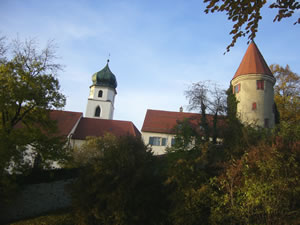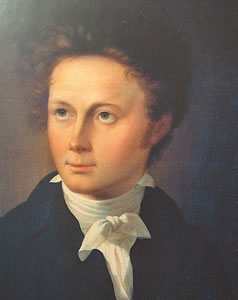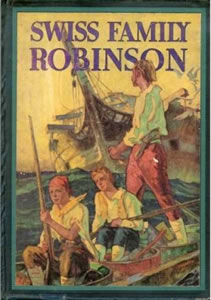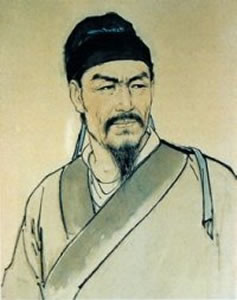De Nederlandse dichter en criticus Ad Zuiderent werd geboren in ’s-Gravendeel op 28 mei 1944. Zie ook alle tags voor Ad Zuiderent op dit blog.
Wind in het haar
Twee keer zo oud als Alexander bijna
bij zijn dood en vrijwel niets veroverd
een paar trouwe lezers hoogstens
maar die dan gedeeld met collega’s –
bijna twee keer zo oud als Jezus en die
stond weer op na zijn dood, ga eerst
maar eens dood dus en zie dan
of anderen zeggen: hij stichtte ooit
zonder volgelingen en zonder iets van
macht, alleen met gedichten, het
geloof in zichzelf, de hoogmis
een fietstocht, een blik op oneindig,
een stop voor een appel, een vlotte
terugweg, gevoel van wind om
het hoofd vooral, niet gehinderd
door andere wijzen van denken dan
van een gelukkige jeugd, kom daar
maar om, en ‘s avonds het rozig
gevoel dat er niets anders hoeft
dan een dag als een gat in het leven,
geen heerser, geen god of diens zoon
maar een leven met wind in het haar.
Tuin der wetenschap
Daar is de lucht geregeld, de zon
geweerd bij dag. Het duister vijftien
vloeren dik is jou een zorg. Pracht van
een hortus om de hoek – geen heemtuin –
met paden van verpulverd hout en
bordjes wie aanwezig is, wie uit.
Daar sproeien slangen hun verdoving
over perk en pad. Tuin van papier;
lees je erover, lijkt het heel wat.
Wat groeit omhoog in vreemde talen?
kijk op de plattegrond: carrière
onder airconditioning. Een boom
van kennis die je longen uit tot
lucht vervloog. Op je bureau een bloed-
spoor van verbeelding? Hou het maar droog.
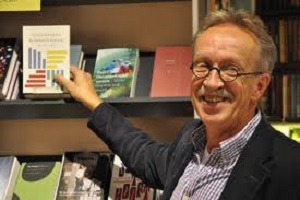
Ad Zuiderent (’s-Gravendeel, 28 mei 1944)
De Belgische schrijver Leo Pleysier werd geboren in Rijkevorsel op 28 mei 1945. Zie ook alle tags voor Leo Pleysier op dit blog.
Uit: De zoon, de maan en de sterren
“– Kom, mama, we beginnen, zegt Maarten. Ben je er klaar voor? vraagt hij.
En dan nog eens: Klaar?
Maar zijn moeder reageert niet. Of toch: ze knippert met haar ogen.
– Oké, dan beginnen we, zegt Maarten.
Moeder (57) en zoon (24) bevinden zich in het appartement op tweehoog van een gerestaureerd Antwerps pand waarvan de ramen aan de straatzijde uitzicht bieden op het viaduct waarlangs de spoortreinen zowel boven– als ondergronds het station van Antwerpen Centraal bereiken. Aan de achterkant kijk je uit op de gecementeerde zijgevel van een synagoge, op een stadstuintje waar een wilde kastanje in bloei staat en op de met een hek omheinde speelplaats van een grote Joodse school. De woonkamer van het appartement is licht en het is er ook aangenaam van temperatuur. Maarten staat met zijn ene schouder tegen de wand geleund. Zijn moeder zit aan tafel: onbeweeglijk, afwachtend en zwijgend.
– Daar gaan we, zegt Maarten.
En met zijn vinger wijst hij de eerste letter aan op het alfabetbord dat hij zes weken geleden tegen de kamerwand, vlak boven de verwarmingsradiator, heeft opgehangen – als ging het om een wandversiering, een schilderij, een kopergravure of een aquarel.
– A! zegt Maarten.
Daarbij kijkt hij zijn moeder recht in de ogen en wacht hij op haar reactie. Maar die volgt niet.
Dan naar de tweede letter.
Ook geen reactie.
– C dan?
Ook niet.
– D?
Ook al niet.
– De E?
– De F?
– De G?
– De H?
– De I?
Nu pas knippert zijn moeder weer met haar ogen, en vervolgens schrijft Maarten met geel krijt de letter
I op het groene schrijfbordje dat vlak onder het alfabetbord is aangebracht.
– Voilà.”
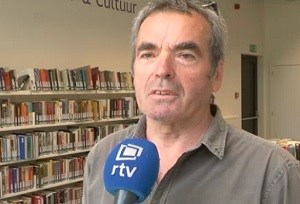
Leo Pleysier (Rijkevorsel, 28 mei 1945)
De Nederlandse dichter en schrijver Adriaan Bontebal werd als Aad van Rijn op 28 mei 1952 in Leidschendam geboren. Zie ook alle tags voor Adriaan Bontebal op dit blog.
Uit: Tot hier en niet verder
“Het was de eerste dag van een nieuwe carrière. Ik ging naar het centrum van de stad en zette mijn fiets vast aan de Haagse Kakmadam, die er volkomen stoïcijns onder bleef. Ze is dan ook een standbeeld, maar dat moet je weten. Op een hink-stap-sprong afstand van haar staat, naast de ingang van C&A, weer of geen weer, een man met één been accordeon te spelen. Om misverstanden te voorkomen: de man heeft slechts één been en zit in een invalidebolide, die naast de ingang van het warenhuis geparkeerd staat. Hij bespeelt zijn knoppen gewoon met zijn handen. Ik liep op hem af en groette joviaal: ‘Ha, collega.’ Waarschijnlijk dacht de man nu dat ik ook muzikaal was; wist hij veel. Mijn stijl van lopen verdient dan geen schoonheidsprijs, maar voor de oppervlakkige beschouwer oog ik redelijk compleet. Ik luisterde even naar zijn spel en moest concluderen dat het echt iets voor de liefhebber was. Zoals brood met zand op het strand. Ik pakte de hoed, die hij uitnodigend voor zich had staan, en telde de inhoud. ‘Het gaat lekker vandaag,’ complimenteerde ik hem, niet zonder bewondering. ‘Er zit zelfs papiergeld bij.’ Ik verklapte hem het totale bedrag, telde de helft voor hem uit en gooide deze terug in de hoed. De rest stak ik in mijn zak. ‘Ga zo door,’ en ik gaf hem een bemoedigende knipoog en een dreun op zijn schouder. Hij miste enkele noten. ‘Wij zien elkaar morgen wel weer.’ Ik haastte me naar de Haagse markt. Daar staat een eenbenige op krukken ansichtkaarten te verkopen.”
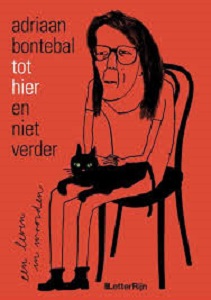
Adriaan Bontebal (28 mei 1952 – 11 februari 2012)
Cover
De Duitse schrijver Guntram Vesper werd geboren op 28 mei 1941 in Frohburg. Zie ook alle tags voor Guntram Vesper op dit blog.
Uit: Nördlich der Liebe und südlich des Hasses
„Er wurde tot in einem Waldstück am Fuß des Hohen Ha-egen gefunden. Das war am fünfundzwanzigsten März. Bedenkliche Zeitungsnachrichten steigerten die Erregung. Niemand konnte nämlich sagen, wie cr ums Leben gekom-men war. Es hieß, sein Kopf sei gar nicht gefunden worden. In der folgenden Nacht brannte der Ziegenstall des Lehrers Meseke nieder. Und am siebenundzwanzigsten März hielt die Bevölkerung eine Versammlung ab. An Grönwohl, der sich in Hannover aufhielt, wurde ein Ultimatum geschickt. Die Bevölkerung verlangte die Herstellung alter Rechte. Mit ergebenem Gruß. An dic Spitze der Fordernden hatten sich Kawe und Bergweitemeier gestellt. Die Versammlung nahm einen stürmischen Verlauf. Alle waren sehr aufgebracht. Sie nannten Grönwohl einen Ausbeuter, den Förster und den Lehrer seine 1 lelfershelfer und Lakaien. Die Ansprachen von Bornemann, Elend und einem Tischler namens Bertram, der aus Göttingen heraufgekommen war, fanden starke Beach-tung. Ende März ließ Grönwohl durch den Lehrer die ein-schlägigen Gesetze verlesen. Es ist nicht bekannt geworden, wie viele Zuhörer Meseke fand, doch am ersten April war das ganze Dorf in Aufruhr. Mit Hacken, Äxten und Spaten zog man auf den Kirchhof. Grönwohl jedoch hatte, um die Be-völkerung und besonders seine Landarbeiter zu beruhigen, einen Ochsen schlachten und mit einem Zentner Kartoffeln verteilen lassen. Allerdings schien das keinen besonderen Eindruck gemacht zu haben. Man nahm hin, was gegeben wurde, aber Liebe entstand nicht. Infolge dessen beklagte Grönwohl beim Pfarrer seinen schlechten Ruf unter den Aufständischen. Er glaubte, mehr verdient zu haben. Der Pfarrer wies auf den abgebrannten Ziegenstall hin und nickte. Am zweiten April wurde der Tote endlich begraben, ohne daß sein Kopf gefunden worden wäre. Allgemein hielt man Grönwohl für schuldig. Anderntags marschierte die Garde der einfachen Leute, der wüste Haufe. Auf Zureden der An-führer hatte man die Fahne auf dem Schloß gelassen, worüber die Schloßbewohner sehr erbittert waren. Grönwohl reiste ab. Keinesfalls wollte er die Fahne eigenhändig übergeben, was die Garde einerseits als Beleidigung empfand und andererseits als Stolz auslegte. Als ein Kind im Basaltbruch den Kopf fand, wußte es nicht gleich, daß es der Kopf war.“
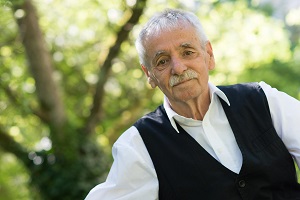
Guntram Vesper (Frohburg, 28 mei 1941)
De Duitse schrijver Frank Schätzing werd geboren in Keulen op 28 mei 1957. Zie ook alle tags voor Frank Schätzing op dit blog.
Uit: Breaking News
„Afghanistan, nördliche Provinzen
Unterwegs in einem Toyota Land Cruiser, sieben Uhr morgens, Sack uberm Kopf, unter der Kinnlade zugebunden. Der offene Mund saugt Stoff an, da durch die Nase nicht genug Luft in die Lungen strömen will, doch tatsächlich ist es ein mentales Problem. Das Gewebe ist durchlässig, der Rest Gewohnungssache.
Kann man sich daran gewöhnen? Seiner Sicht beraubt uber Bergstrasen voller Schlaglöcher zu kacheln, wahrend einem die Rückbank ins Kreuz drischt?
Hängt von den Umständen ab. Selbst in weniger zivilisierten Gegenden gibt es nicht viele Gründe, jemandem eine muffige schwarze Kapuze über den Kopf zu stuüpen. Entweder wird man gleich darauf erschossen oder aufgehängt, womit sich die Frage nach der Gewöhnung erübrigt hat. Oder man wird verschleppt, hört den gelassenen Schritt des Folterers nahen, seine freundliche Stimme, bevor er einem die Hölle bereitet, solcherlei Unannehmlichkeiten.
Dritte Moglichkeit, man trägt das Ding freiwillig, weil der Fahrer nicht will, dass man sich später an die Route erinnert.
Hagen weis, dass Björklund neben ihm weniger gut mit der Situation zurechtkommt. Sein Asthma macht ihm zu schaffen. Ihn selbst stört eigentlich nur, dass sich irgendwann mal jemand in seinen Sack erbrochen haben muss. Der Stoff ist sauber, also gewaschen, aber manche Gerüche setzen sich für alle Zeiten fest. Weniger die Moleküle selbst konservieren die Vergangenheit, als vielmehr die Umstände ihres Hineingelangens, etwa so, wie sich die Gedanken Verstorbener in einem Geisterhaus einnisten. Hagen mag sich nicht vorstellen, welches Schicksal der arme Teufel durchleiden musste, der die Kapuze vollgekotzt hat. Möchte glauben, dass er oder sie das Ding ebenso aus freien Stücken getragen hat wie sie beide in diesem Moment, und weis es doch besser.
War es Marianne Degas, Max Keller oder Walid Bakhtari? Welchem der drei sind unter dem Stoff, der ihn vorubergehend erblinden lasst,
Nerven und Magenwande entgleist?“
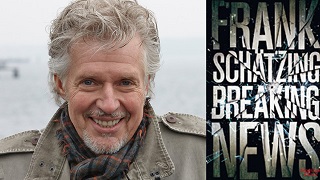
Frank Schätzing (Keulen, 28 mei 1957)
De Ierse schrijfster en columniste Maeve Binchy werd geboren op 28 mei 1940 in Dalkey. Zie ook alle tags voor Maeve Binchy op dit blog.
Uit: Minding Frankie
“Katie Finglas was coming to the end of a tiring day in the salon. Anything bad that could happen had happened. A woman had not told them about an allergy and had come out with lumps and a rash on her forehead. A bride’s mother had thrown a tantrum and said that she looked like a laughingstock. A man who had wanted streaks of blond in his hair became apoplectic when, halfway through the process, he had inquired what they would cost. Katie’s husband, Garry, had placed both his hands innocently on the shoulders of a sixty-year-old female client, who had then told him that she was going to sue him for sexual harassment and assault.
Katie looked now at the man standing opposite her, a big priest with sandy hair mixed with gray.
“You’re Katie Finglas and I gather you run this establishment,” the priest said, looking around the innocent salon nervously as if it were a high-class brothel.
“That’s right, Father,” Katie said with a sigh. What could be happening now?
“It’s just that I was talking to some of the girls who work here, down at the center on the quays, you know, and they were telling me . . .”
Katie felt very tired. She employed a couple of high school dropouts: she paid them properly, trained them. What could they have been complaining about to a priest?
“Yes, Father, what exactly is the problem?” she asked.
“Well, it is a bit of a problem. I thought I should come to you directly, as it were.” He seemed a little awkward.
“Very right, Father,” Katie said. “So tell me what it is.”
“It’s this woman, Stella Dixon. She’s in hospital, you see . . .”
“Hospital?” Katie’s head reeled. What could this involve? Someone who had inhaled the peroxide?
“I’m sorry to hear that.” She tried for a level voice. »

Maeve Binchy (28 mei 1940 – 30 juli 2012)
Cover
De Britse schrijver Ian Fleming werd geboren op 28 mei 1908 in Londen. Zie ook alle tags voor Ian Fleming op dit blog.
Uit: The Man With The Golden Gun
“The Secret Service holds much that is kept secret even from very senior officers in the organization. Only M. and his Chief of Staff know absolutely everything there is to know. The latter is responsible for keeping the Top Secret record known as The War Book’ so that, in the event of the death of both of them, the whole story, apart from what is available to individual Sections and Stations, would be available to their successors. One thing that James Bond, for instance, didn’t know was the machinery at Headquarters for dealing with the public, whether friendly or otherwise — drunks, lunatics, bona fide applications to join the Service, and enemy agents with plans for penetration or even assassination. On that cold, clear morning in November he was to see the careful cog-wheels in motion.
The girl at the switchboard at the Ministry of Defence flicked the switch to ‘Hold’ and said to her neighbour, ‘It’s another nut who says he’s James Bond. Even knows his code number. Says he wants to speak to M. personally.’ The senior girl shrugged. The switchboard had had quite a few such calls since, a year before, James Bond’s death on a mission to Japan had been announced in the Press. There had even been one pestiferous woman who, at every full moon, passed on messages from Bond from Uranus where it seemed he had got stuck while awaiting entry into heaven. She said, ‘Put him through to Liaison, Pat.’ The Liaison Section was the first cog in the machine, the first sieve. The operator got back on the line: ‘Just a moment, sir. I’ll put you on to an officer who may be able to help you.’ James Bond, sitting on the edge of his bed, said, ‘Thank you.’ He had expected some delay before he could establish his identity. He had been warned to expect it by the charming ‘Colonel Boris’ who had been in charge of him for the past few months after he had finished his treat-ment in the luxurious Institute on the Nevsky Prospekt in Leningrad. A man’s voice came on the line. ‘Captain Walker speaking. Can I help you?’ James Bond spoke slowly and clearly. ‘This is Commander James Bond speaking. Number 007. Would you put me through to M., or his secretary, Miss Moneypenny. I want to make an appointment.’ Captain Walker pressed two buttons on the side of his telephone. One of them switched on a tape recorder for the use of his department, the other alerted one of the duty officers in the Action Room of the Special Branch at Scotland Yard that he should listen to the conversation, trace the call, and at once put a tail on the caller.”

Ian Fleming (28 mei 1908 – 12 augustus 1964)
Cover DVD
De Nederlandse schrijver en dichter Sjoerd Leiker werd geboren in Drachten op 28 mei 1914. Zie ook alle tags voor Sjoerd Leiker op dit blog.
Uit: Kind van het elysium
“Men moet zich denken, dat hij zoo den slaap betrad: Hij stond voor de deur van een somber huis. Dat is direct al een ding om een kind schrik aan te jagen. Hij was daar echter al over heen. Toen hij voor de eerste maal voor die deur stond had hij geaarzeld nu niet meer, hij had het zich al zoo vaak gedroomd. Hij duwde tegen de deur, die langzaam dan open week en trad binnen in een hoog vertrek, waar langs de wanden het keukengerei van zijn harde moeder hing. Daar was ook de houten lepel bij, waarmee ze hem eens een bloedende wond aan het hoofd geslagen had. Dat keukengerei en die lepel hingen daar in een honderd-jarige rust. Hij kon wel angstig zijn, maar dan niet voor de rustende requisieten van die vrouw, meer voor de duisternis. Daar kwam hij echter spoedig uit door een tweede deur, die vanzelf open ging. Zoo wordt de slaap een sprookje, nietwaar? Als hij dan die tweede deur achter zich had, zag hij op naar een nachtelijken hemel met drie, vier heldere sterren. Daaronder lag een smalle straat; weerzijds stonden zwarte huizen zonder vensters. Boven het laatste huis welft roerloos, bijna gelijkend op een Moskeedak, de kroon van een zware palm. Een ijzerzware kroon van een palm.
Als hij aan ijzer denkt, wordt hij plotseling erg vermoeid. Hij haast zich voort: de laatste phase van dezen wonderlijken ingang tot den slaap, waarvan niemand ooit den zin zal leeren verstaan. De smalle straat loopt met trappen omhoog, daalt dan plotseling af, met breede trappen eerst, die al smaller worden. De dalingshoek wordt grooter, de straat glijdt omneer in een steeds steiler wordende diepte, een koker, een put. Hij bevindt zich daarin en voelt zich niet duizelig – hij weet immers: zoo is de ingang tot den slaap, elke nacht – en hij daalt steeds dieper.
Heel ver beneden ziet hij opeens zijn hoofd, een schaduw, weerspiegelen in water. Hij denkt, dat het water is, doch hij heeft zich daarvan nooit kunnen overtuigen, omdat hij dàn, plotseling, is waar hij moet zijn: in de vergetelheid, in de rust, in den slaap……”

Sjoerd Leiker (28 mei 1914 – 15 december 1988)
Carillon in het centrum van Drachten
De Russische schrijver en dichter Vladislav Felitsianovitsj Chodasevitsj werd geboren in Moskou op 28 mei 1885. Zie ook alle tags voor Vladislav Chodasevitsj op dit blog.
Avond
Onder de voeten gladheid en gekraak.
De wind woei, het sneeuwde.
Mijn God, wat een droefenis!
Heer, wat een pijn!
Zwaar is Jouw ondermaanse wereld,
en ook Jij bent onbarmhartig.
En waartoe zoveel wijdte,
als op aarde de dood bestaat?
En niemand verklaart
waarom hij in zijn levensavond
nog zin heeft in zwerven,
geloven, verstarren en zingen.
Lentegebrabbel stemt streng
Lentegebrabbel stemt streng
saamgeperste verzen niet mild.
Ik ben gaan houden van het ijzergeknars
van kakofonische werelden.
In de hiaat van open vocalen
adem ik licht en vrij.
In de veelheid van consonanten verbeeld ik me
het gedrang van kruiende ijsschotsen te horen.
Dierbaar is mij – de slag van een gebroken schicht
uit een tinkleurige wolk;
ik houd van het zangerige en kermende
gesnerp van een elektrische zaag.
En in dit leven is me waardevoller
dan al het harmonische schoon –
de siddering, die over de huid rent,
of het koude zweet van ontzetting,
Vertaald door Jan Paul Hinrichs
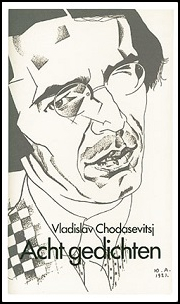
Vladislav Chodasevitsj (28 mei 1885 – 14 juni 1939)
Cover
Zie voor nog meer schrijvers van de 28e mei ook mijn blog van 28 mei 2017 deel 2 en ook mijn blog van 28 mei 2016.




